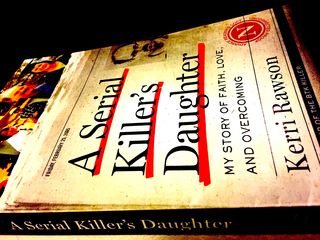Law and Crime
My Father, the Serial Killer
In a new book, a young woman describes a father she loves and loathes.
Posted January 21, 2019

In 2005, when an FBI agent came to her door, Kerri Rawson learned that her father was the infamous “B.T.K.” boogeyman of her hometown, Wichita, KS. Dennis Rader—husband, father, compliance officer and church leader—was a serial killer.
At first, she didn’t believe what she was hearing. She recalled that a close neighbor, Marine Hedge, had been one of the victims. It had scared her, but her father had reassured her. Yet he’d been gone during the night of Hedge’s murder, supposedly on a Scout trip with her older brother, Brian. She started to waver.
Kerri allowed the agent to swab her cheek for DNA, which would confirm her father’s guilt. Then she learned that he’d confessed. Doing the math for his criminal timeline, she realized that one of his victims was killed while her mother was pregnant with her. The man who'd hiked with her, prayed with her, and played with her as a child had murdered a family, including a young girl, to satisfy his sexual lust.
Yet he’d been a good father, protective and caring. Kerri could not let go of this. He could be short-tempered, yes, especially when his possessions were tampered with, but he’d never been abusive. He’d gone to church and had taught her the importance of godliness. Still, there had been moments when he could be scary. “When his eyes turned dark—stormy like an unsettled sea—it was wise to stay clear.”
Kerri describes her father once lunging at her brother over a minor incident, nearly strangling him. She and her mother pulled him away. It was as if some demon in him, as he once had called his “Factor X,” was pushing him toward a homicidal act. (A risk assessment study last year found that one of the most significant red flags for future violence was attempting to choke someone during a domestic assault.)
Feeling off balance after her father's arrest, Kerri had written to him to ask him to stop thinking that things with his family would go on as before. They all needed time to absorb the horrifying revelations about him, as well as his lifetime of lies. She asked him not to put them all through a trial. Rader wasn’t keen to forego the public spectacle, but he finally agreed to plead guilty. This did not spare them the embarrassment of him recounting in a courtroom what he'd done. As the judge questioned him during the plea, he provided details of each and every murder.
Once Kerri came to terms with this confession, she wrote to him on a regular basis as his sentencing approached. She would tell him she loved him, but she felt conflicted. She let more time pass between letters. Rader asked her if he was writing to a “brick wall.” He wondered if she'd abandoned him. He told her, “I’m still family and need a little letter support.”
Then came the sentencing hearing. Rader stood to address the courtroom, referring to his family distantly as his “social contacts.” For Kerri, this was the end. How dare he, she thought. She ended all communication. He sent letters, but she did not reply.
Unable to reconcile Rader's narcissism and criminal disclosure with the father she'd known, Kerri went silent for ten years before finally giving an interview to a Wichita paper in 2015. Since I was working on her father’s autobiography, Confession of a Serial Killer: The Untold Story of Dennis Rader, the BTK Killer, I spoke with him about it. He thought that it signaled her tentative steps toward him again (as well as more publicity for him).
Now, Kerri has published a book to explain why the revelations about her father in 2005 came as such a shock. Her account, A Serial Killer's Daughter: My Story of Faith, Love and Overcoming, describes the confusion and depression she's dealt with since that terrible day when she learned of her father’s double life.
"Today I live with anxiety and depression and PTSD," she says in the book's trailer. "I'm a crime victim from before I was born. I'm a trauma and abuse victim from when I was little. Talking about it has helped me in a way nothing else could. I'm a survivor who wrote this book to help others on their journey of life."
Many people have been duped by double dealers, but those who’ve spent years with one without seeing the signs must also face the jolt of knowing their instincts failed them. How is it possible to live with a serial killer without seeing something? How could you ever trust yourself again?
In the book, Kerri looks back on things her father said that, post-confession, has new meaning. For example, he’d advised her on how to deflect intruders. What once had seemed like loving advice now rang with a sinister tone: He'd advised her from what might deter him. He'd had a favorite barn, which the family had affectionately called his “retirement home,” where Kerri now knew was the setting of his secret fantasies of binding and torturing women.
“It’s horrible to realize that as my dad was raising children,” Kerri writes, “he chose to take another mother away from her own children. He was about to have a daughter, yet took two more daughters away from their families.”
A central metaphor arises from the extended but suspenseful segment in which Kerri describes a six-day hike into the Grand Canyon. Despite Rader’s belief that he was always prepared, he wasn’t. The trip turned dangerous and Kerri witnessed her father losing his sense of control. She went from feeling entirely safe and willing to “follow him anywhere he wanted to go” to knowing that he’d risked their lives.
Eventually, she sought therapy and found some solace in her wavering faith. In December 2012, as an act of healing, Kerri wrote to her father to tell him she forgave him. “I don’t know if I will ever be able to make it for a visit, but know that I love you and hope to see you in heaven some day.”
This memoir, which ends in 2012, is an honest, raw expression of a daughter’s anguish over learning of her father’s criminal duplicity. She hopes that her words might offer support to others in similar situations.
For those of us in criminology and psychology, the narrative also shows the dimensionality of offenders who tend to be portrayed as uniformly evil. Over the past eight years, I’ve seen in Rader the same things his daughter describes: he has many sides, an array of emotions, an ability to care, and the recognition that achieving one of his life goals has deprived him of things far more precious. How deep his remorse for his acts might go (or not) is anyone’s guess, but I believe he does hope that Kerri’s writing effort helps her to heal.
References
Rawson, K. (2019). A serial killer's daughter: My story of faith, love and overcoming. New York, NY: Nelson.




